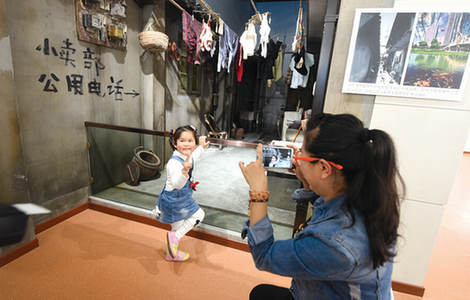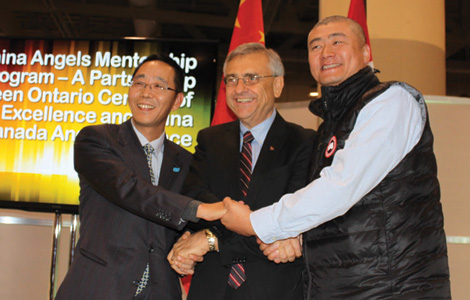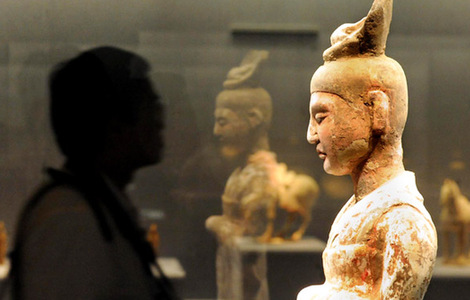China's real estate approach lauded
Updated: 2015-05-01 10:32
By Xiao Lixin in New York(China Daily USA)
|
||||||||
China's approach to investing in the US, particularly in real estate, should help it avoid some of the market risks that Japan ran into in the 1980s and 1990s, the president of the China-US Chamber of Commerce said on Thursday.
Chamber President Wang Zhiwen gave as an example the company Wanke, China's leading real estate developer.
"I think it has chosen the right approach and business pattern to invest in the US," he said. "The Japanese companies chose to make equity investments in the past, while we have, in the real estate industry in particular, started by purchasing land and then constructing buildings, which guarantees considerable profit."
Wang spoke at a chamber meeting at Convene, a corporate conference center in Manhattan.
In 1989, Japan's Mitsubishi Group acquired Manhattan's Art Deco-era Rockefeller Center, controlling up to 80 percent of the complex before its real estate unit walked away from a $2 billion investment, as it and the owner of the other 20 percent filed for bankruptcy in 1995, when the Manhattan real estate market had peaked and rents bottomed.
In 1991, according to The New York Times, the Empire State Building on Fifth Avenue was sold for $42 million to Oliver Grace Jr., who was acting on behalf of Hideki Yokoi, a Japanese businessman. The building was eventually sold for $57.5 million in 2002, in a sale managed by Donald Trump, and is now publicly owned through a realty trust.
In October 2014, China's Anbang Insurance Group Co Ltd bought the famed Waldorf Astoria hotel on Park Avenue in Manhattan for $1.95 billion from Hilton Worldwide Holdings Inc.
Coincidentally, the ESB site was the first home of the Waldorf Astoria hotel, from 1893 until 1929.
"It is crucial to figure out how to effectively control risks, successfully acquiring US companies and making them stay profitable," Wang said. "More importantly for them is to stay in the industry rather than being kicked out of the market in the US.
"As China has become the second-largest economy in the world, it has become an important topic for Chinese and US companies to seize the opportunity (of growth) and integrate the two cultures together, as well as information and capital," Wang said.
Not only has China's economy prospered, but its managerial talent and innovation capacity have grown during the past decade, just like in the US, Wang said. Both China and Chinese companies are getting rich, and some of the Chinese companies have followed their Japanese counterparts' strategy from previous decades by investing in American companies.
It is a good time to invest in the US, especially in real estate, pharmaceutical and cultural industries, Wang said. In the last year, member enterprises of the China-US Chamber of Commerce and the chamber's own investment company invested as much as $500 million in initial public offerings and real estate in New York, with annual rates of return at 20 percent.
"With an average low interest on loans at 4 percent and relatively average rate of return of 7 to 8 percent, foreign companies love to invest in real estate industry in the US," said Sung Choi, executive director of Morgan Stanley.
Yu Lingxiong, chairman of Zhejiang Business and Industrial Group, offered ideas of where US companies could invest in China.
"Coming with the prospering Chinese economy is a series of environmental issues such as the smog, and the Chinese government is committed against pollution," Yu said. "In this regard, US companies have relevant previous experience and technologies which China could borrow from. This has offered huge market room and numerous business opportunities."
Yu predicted that the next 30 years would be an era of consumption pushed by the Chinese middle class, composed of generations born between the 1980s and 2000s. That group could number as many as 200 million.
"Different from their parents' generation , who are used to making and saving money, these young people like to consume, play and put top priority to health, sometimes regardless of whether or not having the money-making ability," said Yu.
"I assume big opportunities would emerge in industries of travel, health care, middle and high-end catering and entertainment such as KTVs."
xiaolixin@chinadaily.com.cn
Most Viewed
Editor's Picks

|

|

|

|

|

|
Today's Top News
China's real estate approach lauded
Abe protests continue in San Francisco
Abe betrays history's conscience
The 'nightmare' everyone saw coming
Vancouver property developer identified as Chinese fugitive: report
Freddie Gray tried to hurt himself in police van
China trainmakers seek control of Bombardier's rail unit
New rich set sights on tech, media and telecom sectors
US Weekly

|

|














